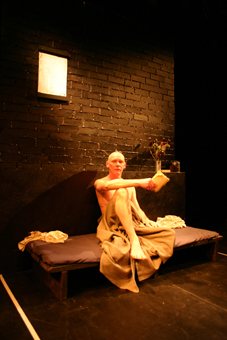 |
Robert Jarman, The Spectre of the Rose photo Carolyn Whamond |
These words are uttered in disgust and defiance by Robert Jarman as he plays Genet in a solo show entitled Spectre of the Rose. The show is staged in Backspace where a small audience is party to the confidences and musings of Genet from prison. His cell is defined by a brick wall at the rear, a sleeping bench, a few personal possessions and a strong white line marked out on the floor. Throughout the work, Jarman remains behind the line, even while leaning his body out emphatically toward the audience.
The show begins uncomfortably. Genet is prone on his bed, placed centrally in the cell. He is clothed in pants and singlet that are thin and holed. Low restless music accompanies his breathing for an indeterminable time and he seems to be struggling with thoughts or nightmares, his body stiff with tension. I sense the spring of a dancer in this man and as if to prove this Jarman’s Genet leaps from his bed and begins his monologue like a ranting madman. He runs around the cell, listens at the wall and is wide eyed as he describes the voices of other prisoners that surround him—some murmured, some screamed, some inaudible. He climbs up high to listen and runs laps around his bed describing the ritual of the discipline yard where men are forced to continually run in a torture that is accompanied by the indignity of defecating in a can in full view of the others.
Once Genet has articulated his dreadful circumstances he quietens and begins to explore his thoughts. It is now that he makes sustained eye contact with audience members and there is a sense that he has decided to trust us. We are his confidante.
Genet’s imagination is rich and dark and perhaps that is how he survived lengthy incarceration. He appears to have the capacity to build relationships with imagined foes and lovers to the point where the heights of experience with those he selects bring him a kind of satisfaction, sexual or otherwise. He shares his heroes with us—they are murderers whose faces he has pasted to a board concealed in his room. He is excited by their crimes. As he says, “The only way to escape horror is to bury yourself in it.”
This portrayal of Genet reveals a complex man. While I believe that we are expected to feel some revulsion at his delight in the worst of human behaviour, Jarman’s Genet is also tender and loving. As he describes his relationship with a fellow prisoner and re-enacts an afternoon of slow dancing in a cell—the only permitted form of affection—the depth of feeling, the love, the grief for this lost love is very moving. To some extent, he is a slave to his own desires and we witness the inability to gain distance from his turmoil culminating in self mutilation. Perhaps this is the inspiration for the trilogy of which this play forms part—Prisoner of Love. Seeing the show is a visceral experience that could be confronting for some as it involves blood, nudity, masturbation and simulated fellatio, but beyond this are moments of lucidity and stunning observations that inspire reflection on the condition of being human in such extremity. Seeing the show is a visceral experience that could be confronting for some as it involves blood, nudity, masturbation and simulated fellatio, but beyond this are moments of lucidity and stunning observations that inspire reflection on what it might mean to be human in such extremity.
Robert Jarman, Spectre of the Rose, performer Robert Jarman, director Franz Docherty, lighting design Tim Munro, production/stage manager Andrew 'Ghost' MacDonald; Backspace, Hobart, Ten Days on the Island, March 24-27
Judith is a Hobart based Graduate Architect and Sculptor who is developing a hybrid practice working between these fields. She writes about art and design for a number of national magazines.
© Judith Abell; for permission to reproduce apply to [email protected]








 back
back